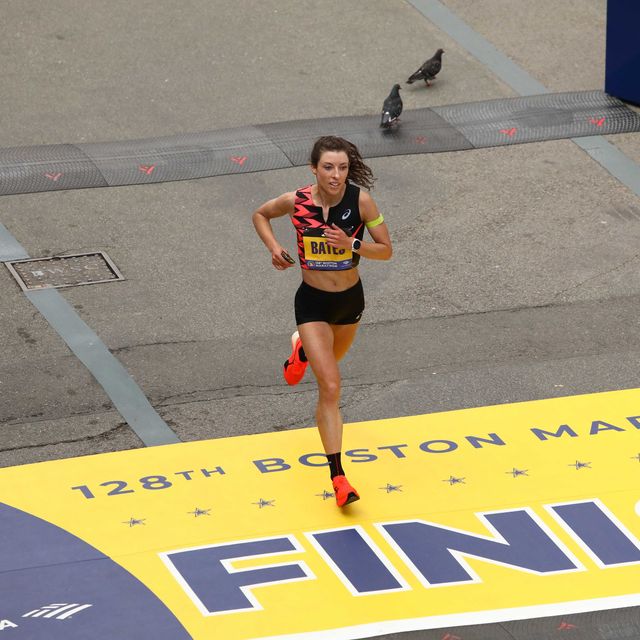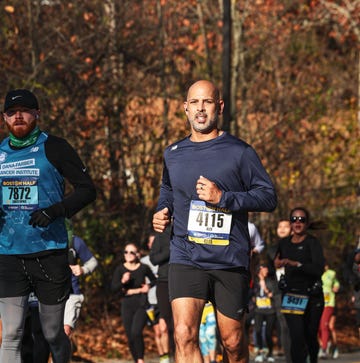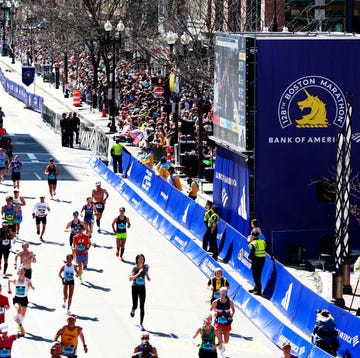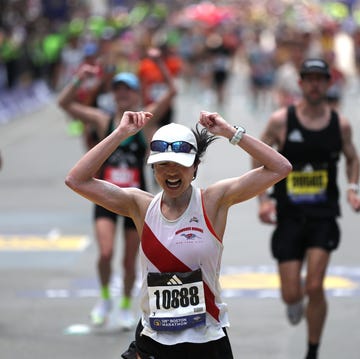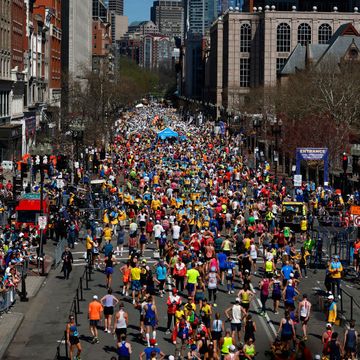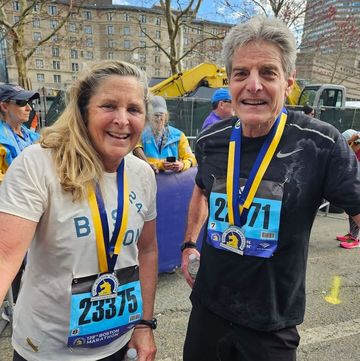For the first 20 miles, American Emma Bates looked poised to repeat her outstanding performance in last year’s Boston Marathon, when her time of 2:22:10 earned her a fifth-place finish and a minute-plus personal best.
But after leading for the majority of the race, Bates, 31, dropped off the still-large lead pack around Heartbreak Hill, and never caught back up. By mile 23, she’d dropped to 15th place. She passed Kenya’s Helah Kiprop and Vibian Chepkirui in the final 2 miles to finish 12th and top American, though her time of 2:27:14 was more than 5 minutes slower than last year.
“I didn’t have quite the legs in me” to handle both the hills and the surging pace, she told Runner’s World and a minute-plus personal best.
Although a 12th-place finish wasn’t quite what she’d hoped for, Bates said given that she tore her plantar fascia at the Chicago Marathon last fall and spent much of the winter rehabbing, she couldn’t help but feel satisfied.
“Coming back from that, I’m just so proud that I was able to not only compete and take 12th place, but just show up to the starting line in general,” she said. “I’m happy with my effort today. I can’t be upset with being the top American, either.”
Bates didn’t necessarily intend to lead, but following the advice of her coach, Joe Bosshard, she focused on running her own pace—he’d told her to “treat it like a long run, with a little more pizzaz,” she said at the post-race press conference. She struck out on her own early, covering the first downhill mile in 5:18. As the pack surged around her, especially around the water stations, she kept a steady rhythm in the 5:30s.
For much of the race, she ran with evident joy. Just before the 12-mile mark, she smiled and waved at spectators; during the infamous scream tunnel in Wellesley the next mile, where students line the course with signs and ask for kisses, she ran to the right and high-fived the crowd.
“Whenever I am feeling tired or tense or anything, I try to take in what’s going on around me—it really keeps me in the moment,” she said. “Especially when it comes to the marathon, that gets me fired up, trying to give as many high fives.”
A pack of more than 20 women—including Bates, American Sara Hall, and eventual winner Hellen Obiri of Kenya—hit the halfway mark at 1:12:33, a pace of 5:32 per mile. Not long afterward, 2018 champion Des Linden caught up and offered Bates a few words of encouragement, a moment Bates described afterward as particularly meaningful.
Bates slipped off the pack only briefly after mile 16, but by the next mile marker, reattached—and retook the lead for the next several miles. But as the leaders picked up the pace in the final 10K, Bates fell back. While Obiri and second-place finisher Sharon Lokedi covered the 5K from 35K to 40K in 15:06, Bates ran the same distance in 17:53, a 5:45 pace.
“They dropped the hammer so hard that I just wasn’t able to get my legs moving that quickly,” she said. By mile 23, she knew for sure the leaders were out of reach. She worked with Kiprop and Chepkirui to stay as steady as she could. They—and the crowd—kept Bates' spirits high into the finish.
“They were chanting ‘USA’ even though I wasn’t, like, about to win,” she said. “The support was out there and I could feel it and I just wanted to get to the finish line as quickly as possible and try to make everybody proud.” Afterward, she embraced and congratulated Hall, who took 15th in 2:27:58, and Linden, who was 16th in 2:28:27.
Bates also led for much of the race last year, staying at or near the front of the pack from miles 10 to 23. She went on to finish fifth overall and first American; her time of 2:22:10 made her the second-fastest U.S. woman ever to run the course, behind only Shalane Flanagan, who ran 2:22:02 in 2014.
After that standout performance, Bates was widely expected to make the team at February's Olympic Marathon Trials in Orlando. She lined up in Chicago in the fall—a race in which she finished second in 2021—Adidas Unveils Boston Marathon Jacket duel April Marathons for Runners Shut Out of Boston.
All About 75 Hard finish 13th in 2:25:04, left the finish line in a wheelchair, then found out about the torn plantar afterward. Though she tried to recover from that, and a case of posterior tibial tendonitis, in time for the Trials, things didn't move as quickly as she'd hoped, and she announced in January that she wouldn't line up in Orlando.
Pre-race, Bates said weeks of cross-training and a gradual return to running left her confident in her fitness—in fact, she felt fitter and faster than ever. Though her performance fell short of that, she remained positive about the experience. “The point of running in general is to have fun,“ she said. “I think I really did have the most fun out there today.”
—since 2013. Shes the coauthor of both.

Cindy is a freelance health and fitness writer, author, and podcaster who’s contributed regularly to Runner’s World since 2013. She’s the coauthor of both Breakthrough Women’s Running: Dream Big and Train Smart and Rebound: Train Your Mind to Bounce Back Stronger from Sports Injuries, a book about the psychology of sports injury from Bloomsbury Sport. Cindy specializes in covering injury prevention and recovery, everyday athletes accomplishing extraordinary things, and the active community in her beloved Chicago, where winter forges deep bonds between those brave enough to train through it.
